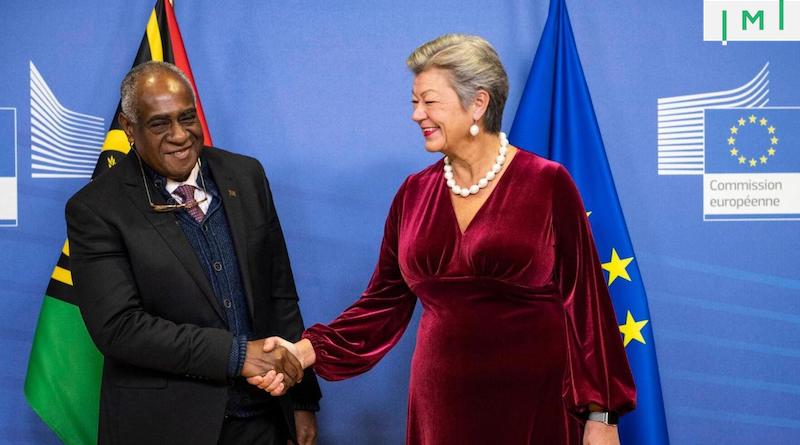EU Gives Vanuatu 18 More Months to “Fix” CIP Before Enacting Full Suspension of Schengen Visa-Waiver
The European Council has agreed to give Vanuatu another 18 months to reform its program before it implements a full suspension of the country from the Schengen area’s visa-waiver agreement.
Background
On January 12th, the European Commission proposes a partial suspension of Vanuatu’s visa-free travel agreement with the EU, citing security “risks posed by Vanuatu’s investor citizenship schemes.”
The decision followed Vanuatu’s announcement in the preceding month that it would open a third CBI program, the “Real Estate Option program”, which was set to have a single master agent.
On March 4th, the European Council adopts the Commission’s proposed partial suspension, affecting ni-Vanuatu citizens whose passports were issued after May 25th, 2015 (when the country’s large-scale CBI operations began in earnest).
On March 31st, Vanuatu establishes a National Task Force to “assess and mitigate” the EU’s concerns about ni-Vanuatu CBI, as well as to “engage in meaningful dialogue” with the EU.
On May 4th, the partial suspension takes effect. The following week, representatives of Vanuatu meet with the Commission, which makes clear that Vanuatu will have until February 3rd, 2023 to reform its programs or see the visa-waiver suspension extended by another 18 months.
In early June, Switzerland follows the European Council in partially suspending visa-free travel to ni-Vanuatu passport holders. By the end of the first half of 2022, figures from Vanuatu’s Department of Treasury and Finance show that government revenue has been hard-hit by the suspension.
In November 2022, the European Council, after decrying “a lack of progress” in reforming the program, extended the visa-waiver suspension to cover all ni-Vanutu passport holders, even those whose citizenships were issued prior to 2015. The move was widely considered punitive, as it could not be justified on the basis of “security concerns” since CBI citizens were already covered by the suspension.
In November, the European Council announced that it would convert its partial suspension of Vanuatu from the Schengen visa-waiver program to a full suspension (covering all ni-Vanuatu citizens, not just those who became citizens after 2015) by February 3rd, unless the program could “get its house in order” by then.
In November last year, Prime Minister Ishmael Kalsakau wrote to the European Council, requesting a six-month extension of the deadline in an effort to ward off full suspension. In December, the PM also led a delegation to the EU and presented plans for his government’s reform of the Vanuatu citizenship by investment programs.
The European Council, reports Vanuatu’s Daily Post, agreed to extend the deadline by 18 months, (i.e. a full 12 months more than requested), meaning Vanuatu will have until August 3rd, 2024, to reform its program to the EU’s satisfaction. It was not clear whether a successful reform would merely ward off a full suspension or if it would also lift the current partial suspension.
The EU, according to reports, will “continue to work closely with the established committees through virtual meetings so they get first-hand information on progress made on the ground.”
Vanuatu government Public Relations Officer Joe Harry said Vanuatu’s ambassador in Brussels would conduct virtual meetings with the country’s Technical Committee to prepare the team for another meeting with the EU on February 15th.
Vanuatu’s relatively new government has outlined a number of planned reforms for its citizenship by investment programs, each of which seeks to address the EU’s concerns about inadequate security screening:
Among other changes, the government plans to enact administrative and policy reforms regarding how it manages its Citizenship Office, how citizenships applications are processed, and how it manages its approved agents. Second, it plans to enact a series of legislative reforms, specifically the Civil Registration and Identity Management Act (presumably to prevent name changes upon naturalization).
News that Vanuatu will actively involve the EU directly in overseeing the program’s reform is notable:
This would be the first time, as far as IMI is aware, that the EU has actually taken part in the planning of a CIP. If Vanuatu brings the EU in on the planning of the program and then gets its seal of approval, the EU will effectively have legitimized the concept of citizenship by investment. It would no longer, then, be a question of whether countries should sell their citizenship but of how they should sell it.
Of course, the Commission could persist in demanding reforms so harsh they would effectively render the programs unattractive. Home Affairs Commissioner Johansson (who met with PM Kalsakau in December) has publicly backed the European Parliament’s adoption of MEP Sophie in ‘t Veld’s report on investment migration, which explicitly sought to end CBI both in Europe and elsewhere. It proposed to regulate RBI programs in the EU to such a degree as to make them unappealing.
Image credit: Vanuatu Daily Post


